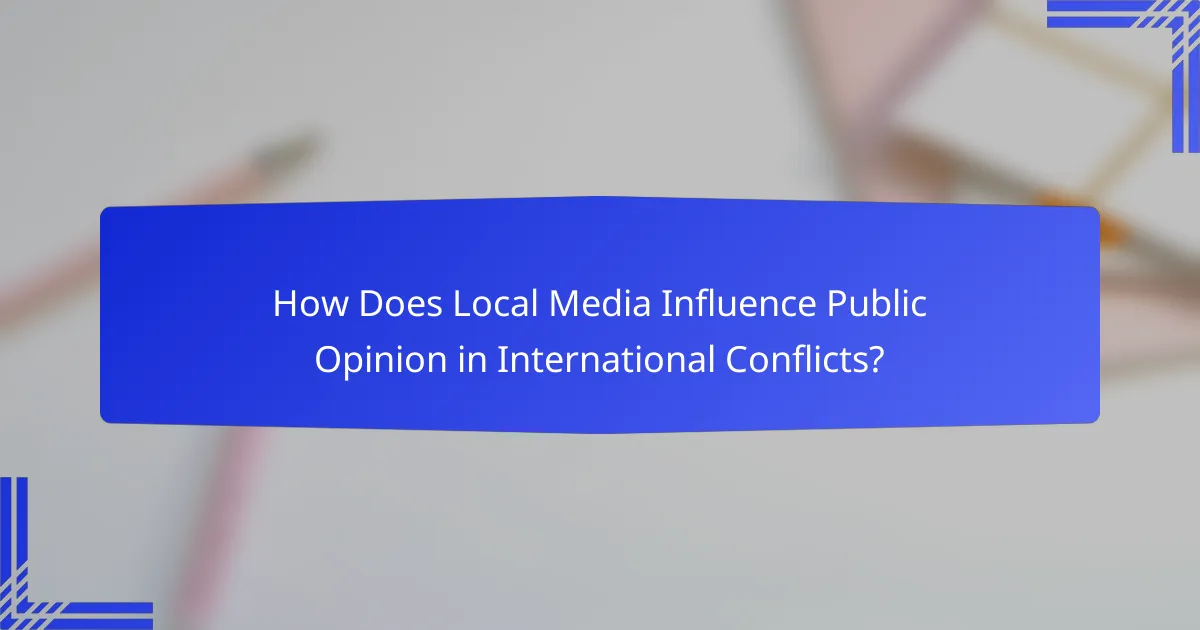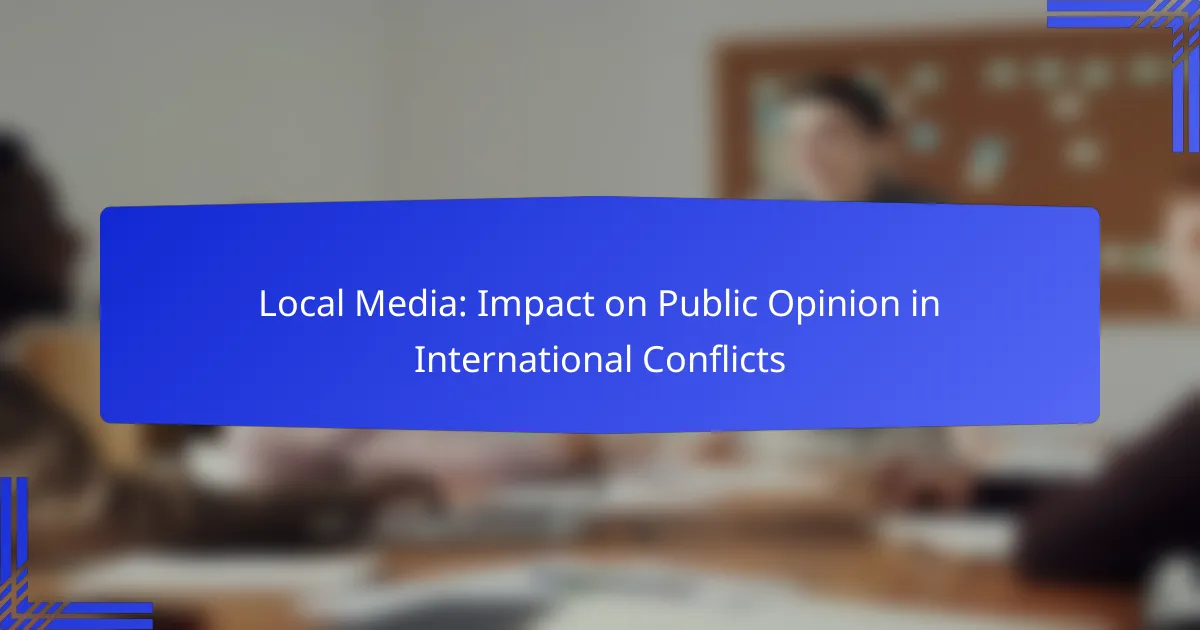Local media plays a pivotal role in shaping public opinion during international conflicts by offering context and framing narratives that resonate with communities. Through timely and relevant reporting, local journalists serve as key sources of information, influencing how conflicts are perceived and understood. The diversity in local media outlets further impacts public attitudes, highlighting the varying degrees of media coverage and accessibility across different regions.

How Does Local Media Influence Public Opinion in International Conflicts?
Local media significantly shapes public opinion during international conflicts by providing context, framing narratives, and engaging communities. Their coverage can sway perceptions and attitudes, impacting how conflicts are understood and responded to by the public.
Shaping narratives
Local media plays a crucial role in shaping narratives around international conflicts by selecting which stories to tell and how to present them. By focusing on specific events or perspectives, they can create a dominant narrative that resonates with local audiences. For instance, emphasizing humanitarian aspects can foster empathy and support for intervention.
Moreover, the choice of language and imagery can evoke strong emotional responses, influencing public sentiment. Local outlets often highlight personal stories, making complex geopolitical issues more relatable to their audience.
Framing issues
Framing issues involves presenting information in a way that highlights certain aspects while downplaying others. Local media can frame international conflicts through various lenses, such as national security, human rights, or economic impact. This framing can significantly affect how the public perceives the stakes involved.
For example, portraying a conflict as a threat to national security may lead to increased support for military action, whereas framing it as a humanitarian crisis might generate calls for aid and intervention. Understanding these frames helps audiences critically evaluate the information they receive.
Community engagement
Local media fosters community engagement by encouraging public discourse and participation in discussions about international conflicts. They often provide platforms for local voices, allowing community members to express their opinions and concerns. This engagement can lead to a more informed public and a sense of collective responsibility.
Additionally, local media can organize events, such as town hall meetings or forums, to facilitate dialogue between citizens and policymakers. This direct interaction can empower communities to influence decisions related to international conflicts, ensuring that local perspectives are considered in broader discussions.

What Role Do Local Journalists Play?
Local journalists play a crucial role in shaping public opinion during international conflicts by providing timely, relevant, and context-rich reporting. They often serve as the primary source of information for their communities, influencing perceptions and reactions to global events.
Investigative reporting
Investigative reporting by local journalists uncovers hidden truths and provides in-depth analysis of international conflicts. This type of journalism often involves extensive research, interviews, and fact-checking to expose corruption, human rights violations, or misinformation that may affect public perception.
For example, a local journalist in a conflict zone might investigate the impact of foreign military actions on civilian populations, revealing stories that national media may overlook. This reporting can lead to greater accountability and informed public discourse.
Local perspectives
Local journalists offer unique perspectives that reflect the experiences and opinions of their communities during international conflicts. They are often more attuned to the cultural, social, and economic implications of these events, providing context that national outlets may miss.
By sharing stories from local citizens, journalists help humanize the conflict, fostering empathy and understanding among audiences. This can be particularly impactful in areas where public opinion is polarized, as it encourages dialogue and can influence policy discussions at higher levels.

How Do Local Media Outlets Compare Globally?
Local media outlets vary significantly across the globe in terms of their influence, accessibility, and the nature of their reporting on international conflicts. These differences can shape public opinion and impact how communities perceive global events.
Case studies from different countries
In the United States, local news stations often focus on national narratives but may provide unique regional perspectives that influence local public opinion on international issues. For example, coverage of conflicts in the Middle East can be framed differently depending on local demographics and political leanings.
Conversely, in countries like Russia, state-controlled media outlets dominate the landscape, often presenting a singular narrative that aligns with government interests. This can lead to a homogenized view of international conflicts, limiting public discourse and understanding.
In contrast, local media in countries such as Germany may offer a more balanced approach, incorporating diverse viewpoints and fostering informed discussions about international affairs, which can lead to a more nuanced public opinion.
Impact assessment
The impact of local media on public opinion during international conflicts is profound, as it shapes narratives and influences perceptions. Research indicates that local outlets can significantly sway public sentiment, especially when they provide in-depth analysis and context.
For instance, local media that engage with community concerns and highlight personal stories can enhance empathy and understanding, leading to more supportive public attitudes towards international humanitarian efforts. However, sensationalized reporting can create fear and misinformation, skewing public perception negatively.
To assess the impact, consider factors such as audience engagement, the diversity of viewpoints presented, and the accuracy of information. Local media that prioritize factual reporting and community involvement tend to foster healthier public discourse regarding international conflicts.

What Are the Challenges Faced by Local Media?
Local media often encounter significant challenges that hinder their ability to effectively inform the public, especially during international conflicts. Key issues include resource limitations and censorship, which can severely impact the quality and reliability of the information they provide.
Resource limitations
Resource limitations are a major hurdle for local media outlets, affecting their capacity to cover international conflicts comprehensively. Many local news organizations operate on tight budgets, which restricts their ability to hire experienced journalists, invest in technology, or conduct in-depth investigations.
In regions with ongoing conflicts, these limitations can lead to reliance on wire services or foreign correspondents, resulting in a lack of local context in reporting. For instance, a local outlet might struggle to send reporters to the front lines, relying instead on second-hand information, which can compromise accuracy and depth.
Censorship issues
Censorship issues pose another significant challenge for local media, particularly in countries with authoritarian regimes or during times of heightened national security. Governments may impose strict regulations on what can be reported, leading to self-censorship among journalists who fear repercussions.
This environment can create a distorted public perception of international conflicts, as critical viewpoints and dissenting opinions may be suppressed. Local media must navigate these censorship challenges carefully, often prioritizing safety over comprehensive coverage, which can result in an incomplete narrative for the audience.

How Can Local Media Enhance Public Understanding?
Local media can significantly enhance public understanding by providing contextually relevant information and diverse perspectives on international conflicts. Through localized reporting, communities gain insights that are often overlooked by national or international outlets, fostering a more informed public discourse.
Educational programs
Educational programs initiated by local media can play a crucial role in informing the public about international conflicts. These programs often include workshops, seminars, and online courses that aim to explain complex geopolitical issues in accessible terms.
For instance, local stations might partner with universities to host discussions that break down the historical context of a conflict, helping audiences understand the underlying causes and implications. Such initiatives can increase civic engagement and encourage critical thinking among community members.
Collaborative journalism
Collaborative journalism involves partnerships between local media outlets and international news organizations to produce comprehensive coverage of conflicts. This approach allows local journalists to share their unique insights while benefiting from the resources and expertise of larger entities.
By working together, these collaborations can create more nuanced narratives that reflect the local population’s experiences and perspectives. For example, a local news outlet might report on the impact of a conflict on its community, while an international partner provides broader context, resulting in a richer understanding for the audience.

What Are the Best Practices for Local Media Reporting?
Local media reporting should prioritize accuracy, transparency, and ethical standards to effectively shape public opinion during international conflicts. By adhering to best practices, local media can foster trust and provide audiences with reliable information.
Fact-checking protocols
Implementing robust fact-checking protocols is essential for local media to ensure the accuracy of their reporting. This involves verifying information from multiple credible sources before publication and correcting any errors promptly. For instance, using fact-checking organizations or dedicated in-house teams can help maintain high standards.
Local media should also establish a clear process for audience engagement, allowing readers to report inaccuracies. This feedback loop can enhance accountability and improve the overall quality of reporting.
Ethical guidelines
Ethical guidelines are critical for local media to navigate the complexities of reporting on international conflicts. These guidelines should emphasize fairness, impartiality, and respect for all parties involved. For example, avoiding sensationalism and providing context can help audiences understand the nuances of the situation.
Moreover, local media should prioritize the protection of vulnerable populations by being mindful of language and imagery used in reporting. Establishing a code of ethics that aligns with international standards can further strengthen the credibility and trustworthiness of local media outlets.

How Do Social Media Platforms Affect Local Media’s Role?
Social media platforms significantly influence local media by expanding its audience reach and altering how information is disseminated. These platforms serve as both a distribution channel and a source of competition for local news outlets.
Audience reach
Social media platforms enable local media to reach a broader audience than traditional methods alone. By sharing news articles and updates on platforms like Facebook and Twitter, local outlets can engage with users who may not consume their content through conventional means.
This expanded reach can lead to increased visibility for local issues, allowing communities to become more informed about regional events and conflicts. However, local media must adapt their strategies to capture the attention of social media users, who often prefer quick, engaging content.
Information dissemination
Social media accelerates the dissemination of information, allowing local media to share breaking news almost instantaneously. This immediacy can enhance public awareness of international conflicts and local responses, fostering a more informed citizenry.
However, the rapid spread of information can also lead to misinformation. Local media must prioritize fact-checking and credible sourcing to maintain their authority and trustworthiness. Engaging with audiences through comments and shares can further enhance the dialogue around critical issues, but it requires careful management to avoid the pitfalls of sensationalism.

What Future Trends Are Emerging in Local Media?
Local media is increasingly adapting to technological advancements and changing audience preferences. Key trends include the rise of digital platforms, personalized content delivery, and a greater emphasis on community engagement.
Increased Digitalization
As more consumers turn to online sources for news, local media is shifting towards digital platforms. This transition allows for real-time updates and interactive content, making news more accessible. Local outlets are investing in mobile apps and social media to reach audiences where they spend most of their time.
Personalized Content Delivery
Local media is leveraging data analytics to tailor content to individual preferences. By analyzing user behavior, outlets can deliver news that resonates with specific demographics, enhancing engagement. This trend is evident in the use of targeted newsletters and customized news feeds.
Community-Centric Reporting
There is a growing focus on community-centric reporting, where local media emphasizes stories that matter to their specific audiences. This approach fosters a stronger connection between media outlets and their communities. Initiatives like local forums and citizen journalism are becoming more common, encouraging active participation in news creation.
Collaboration with Other Media Outlets
Local media is increasingly collaborating with other outlets to share resources and expand reach. Partnerships can enhance content diversity and provide broader coverage of local issues. Such collaborations can include joint investigations, shared reporting resources, or co-hosted events, benefiting both parties and their audiences.
